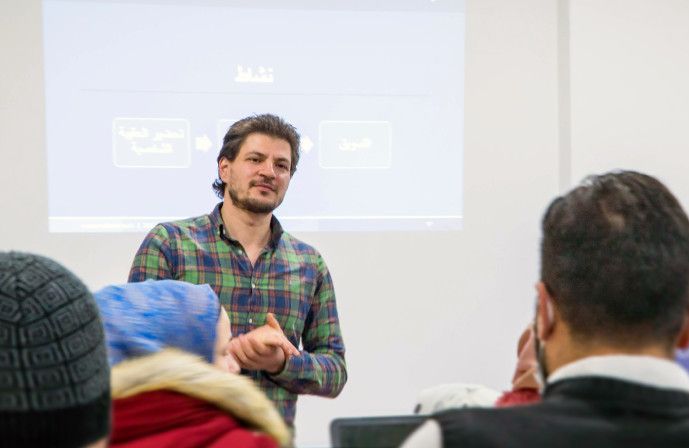Who We Are
- Home
- About Us
See how ICT can protect people’s development, learning, well-being and future in the face of conflict and disaster

Our Story
Standing by those in need
Roia Foundation was born in 2012, from the need to create an alternative path for those whose lives had been shattered by conflict and disaster. Amidst the chaos and destruction of the ongoing crisis in the Middle East, a group of young people used what they had, their passion and knowledge in ICT, to help their own community survive and look to the future.
During its first steps, Roia’s team installed satellite internet and built transmission towers to let conflict-affected communities communicate with the world. It also worked to guarantee two basic needs: safe and secure communication for human rights defenders and actors, and a telecommunications system for healthcare. Inspired by the change they saw in those conflict-affected communities, Roia felt the need to expand its activity, continuing to support war-affected communities and help human rights defenders spread their message.
In 2013, that group of young people moved to Turkey, looking for a more stable and connected environment where the organisation could grow, reach more people and cover more crucial sectors. They felt there was opportunity to expand their mission to education, employability and gender equality. Here, the idea became a long-term commitment and took the name of Roia. Roia, which means ‘vision’ in Arabic, seemed a perfect name to identify a project born without preconception as an instinctive response to the needs of those living under siege or in vulnerability. In Istanbul, Roia has taken a more comprehensive and long-term strategy to reach disadvantaged and conflict-affected communities in the Middle East.
In 2018, Roia moved its base of operation to the Netherlands and has since worked to also address the needs of the most-disadvantaged in Europe.
Today, the Roia Foundation is working in about five countries with several mission partners, humanitarian organisations that benefit from our work and local communities which support us. It works to enact positive social change for disadvantaged and conflict-affected communities, and help them regain hope in their own future. However, we are just at the beginning of our story.
Our Mission
Harnessing the Power of ICT for Positive Social Impact
We believe in the transformative benefits of Information and Communication Technology (ICT), particularly for humanitarian response. We use our ICT expertise and experience to help the vulnerable, especially in conflict-affected communities, so they can recover, reconnect and look to the future.
By developing and adapting ICT infrastructure and technology-based solutions to their needs, we aim to address the challenges individuals face in accessing safe learning and livelihood opportunities, and help them live a secure and dignified life.
We provide effective and innovative long-term solutions for disadvantaged and marginalised people. To put humanitarian values at their core, they are socially inclusive and locally-relevant – vital factors for any program that aims to help refugees, Internally Displaced Persons, people with disabilities, women and girls. We also provide tools and solutions to local civil society organisations that drive their digital transformation, improve efficiency and echo their voices and mission.
Where We Work
We Go Where The Need Is
Our Trustees
Meet Our Board Of Directors
Board members are appointed for an indefinite term and act in a voluntary capacity. The members of the board do not receive any remuneration for their work, but expenses incurred can be reimbursed.
